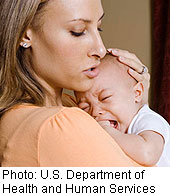
WEDNESDAY, April 20 (HealthDay News) — Excessive sleeping, feeding or crying troubles during infancy are associated with a greatly increased risk for behavioral problems later in childhood, research suggests.
Such behavior, which the researchers describe as “regulatory problems,” were the focus of an analysis of 22 studies conducted between 1987 and 2006. Data came from 16,848 children, including 1,935 with regulatory problems who were tested.
The researchers found that infants with regulatory problems were more likely to have childhood behavioral problems than were other infants. The most likely childhood behavioral issues for infants with regulatory problems were attention-deficit/hyperactivity disorder and externalizing problems, such as aggressive or destructive behavior, conduct problems and temper tantrums.
The more types of regulatory problems displayed by an infant, the more likely the child was to exhibit behavioral problems later, according to the study, published online April 20 in Archives of Disease in Childhood.
“Our findings highlight the need for prospective follow-up studies of regulatory disturbed infants and require reliable assessments of crying, sleeping or feeding problems,” Mirja Helen Hemmi, of the Institute of Psychology at the University of Basel, Switzerland, and colleagues wrote in a journal news release.
“The evidence from this systematic review suggests that those with persisting regulatory problems in families with other problems may require early interventions to minimize or prevent the long-term consequences of infant regulatory problems,” the study authors concluded.
More information
The American Academy of Family Physicians has more about child behavior.

